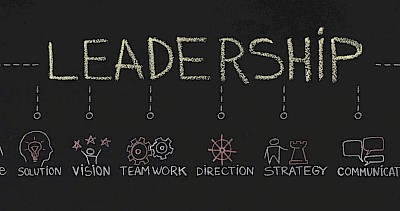
Build resilience
Build resilience
Whether private strokes of fate, professional challenges or even exceptional global situations - no one is immune to crises in life. However, people differ in the way they deal with such situations. While some people recover quickly and are perceived as being particularly resilient, others reach their breaking point much earlier. Especially in professional life, a high level of resilience is becoming increasingly important. Because changes are on the agenda in the fast-paced world. This is where your resilience is needed. But what is resilience actually? Why is it so important and how can you build resilience? In this blog article, you will learn how optimism, acceptance, solution orientation and many other resilience factors can best equip you for life's challenges.
Building resilience: What is resilience?
Whether in a private or professional context - in our lives we are repeatedly confronted with challenges and experience crises that need to be survived as unscathed as possible. People who have a high degree of resilience are better able to cope with exceptional situations. This does not mean that these people are indifferent to what is happening and switch off negative feelings and thoughts, but on the contrary are able to deal with it in a solution-oriented way. Resilience therefore describes the ability to remain resilient and overcome setbacks despite adverse circumstances. Resilience is thus a protective factor against mental and physical stress that enables us to remain flexible and capable of action in exceptional situations. To be able to react better to stress and challenges and recover more quickly, it is advisable to build up one's resilience.
Why is strengthening one's resilience important?
Strong resilience can help us make positive changes in our lives and stay optimistic and motivated even in difficult times. While resilience can contribute to a fuller and happier life, it can also make it easier for you to deal with different situations. Especially in your professional life, you can benefit greatly from building your resilience. Stressful situations and challenges are part of professional life. If you don't let them upset you so quickly and instead keep a cool head, you can cope better with delicate situations. Thus, a high level of resilience ensures:
- a good way of dealing with change
- healthy stress behaviour
- a more relaxed private life
Strengthening your resilience: How to build resilience.
While resilience research has found that resilience is partly genetic, it can be trained like a skill in any case. So if you want to build resilience, you have to address the individual resilience factors separately and thus build your resilience through different paths. Not only self-efficacy and acceptance, but also solution orientation and many other skills play a role:
1. network orientation: create a reliable social environment for yourself.
In difficult times, it is important to seek social support and exchange ideas with others. Reference persons such as family members, friends or colleagues can help you to cope with challenging situations and to look at situations from a different perspective. Professional help, such as from a coach or therapist, can also help strengthen your own resilience. If you want to build your resilience, you should therefore cultivate existing contacts and not be afraid to make new acquaintances and develop relationships.
2. build resilience: Train your acceptance
As much as you may dislike change, some fates cannot be averted and must be accepted sooner or later. The sooner you are able to accept your fate and devote your energy to the things you can actually influence, the faster you will get through crisis situations. This already starts with small things in everyday life. The weather is bad or there is a lot going on in the streets? There is nothing you can do about that. Take such situations calmly and don't get upset. Patience also plays an important role in this context. Not all problems can be solved overnight. If you are patient and always bear in mind that many things take time to resolve themselves, you can cope better with crises.
3. solution-oriented thinking for more resilience
If you bury your head in the sand at the slightest problem, you won't get far in life. Don't get into a victim role in explosive times, but take matters into your own hands and look at your options for action. What does the situation look like? What can you do to improve it? By facing the problems and thinking in a future-oriented way instead of trying to find the cause over and over again, you will get much further with solving a problem and can thus build your resilience.
4. open to new things: seek & master new challenges
Are you open to new things? If you don't have a problem with change or are even actively looking for new challenges, it is easier for you to adapt quickly even to unpleasant situations. If you want to build your resilience and don't always devote yourself to new things anyway, you should occasionally put yourself in unfamiliar situations and force yourself to deal with them. By regularly stepping out of your comfort zone, you learn to grow on yourself. Also, don't avoid problems, but confront them. The more often you don't make things easy for yourself and take the longer route, the better you will be able to deal with other adversities.
5. overcome strokes of fate with optimism & frugality.
Positive thoughts and emotions are an important clue to building one's own resilience. By developing a positive basic attitude and focusing on one's own strengths and successes, one can learn to cope better with crises and get back up faster after a fall. If you can enjoy the little things in life and don't need much to be happy, you will be better able to do without even in times of crisis. Focus on the things in life that bring you joy and that you have. Writing in a diary or jotting down positive thoughts can also help you to develop an optimistic attitude, to find rays of hope in dark times and to basically go through life with more confidence.
6. with more self-esteem & self-confidence to self-efficacy
A positive self-perception and a high level of self-confidence enable you to cope better even with challenging situations. Because if you believe in yourself, you are able to see crises as opportunities and not as insurmountable obstacles. A certain level of self-confidence can help you to find alternative solutions more quickly and to make decisions self-efficiently even in turbulent times. Thus, strong self-confidence is an important protective factor against psychological stress and a significant factor in building your own resilience.
7. self-care: take care of yourself and take time out
Stressful events bring with them many negative thoughts that are not always so easy to suppress. Give yourself a break from too much negativity and focus on the here and now. Through regular meditation or yoga exercises, you can learn to calm your mind and actively relax. Relaxation techniques such as autogenic training or progressive muscle relaxation can also help with stress management and build your own resilience. At the same time, you literally give your brain a break from thinking and can then find solutions again with a fresh mind that you had not thought of before.
8. situation assessment & self-reflection: be your own role model
You can best survive states of emergency if you are able to reflect on your situation and control your reaction to it. Is the situation really as hopeless as it feels at first? People often tend to overestimate the situation and dramatise it. In the next step, look at yourself. With your experience and expertise, you are most likely up to the situation and do not need to doubt that you will survive the crisis. Practise becoming more relaxed and forgiving with yourself.
Conclusion: Building resilience and surviving turbulent times
Building your own resilience means being better prepared for exceptional situations. It is an important skill for successfully navigating through life and also mastering difficult times. Researchers have come to the conclusion that genetics has an impact on personal resilience to some extent, but it can be built through targeted support and training. In addition to strengthened bonds with caregivers and learning acceptance, openness and self-care, resilience is based on many other pillars that can be used to counteract stressors in challenging times. Would you like to strengthen your resilience even more specifically? In our resilience seminar we provide you with important practical tips.









